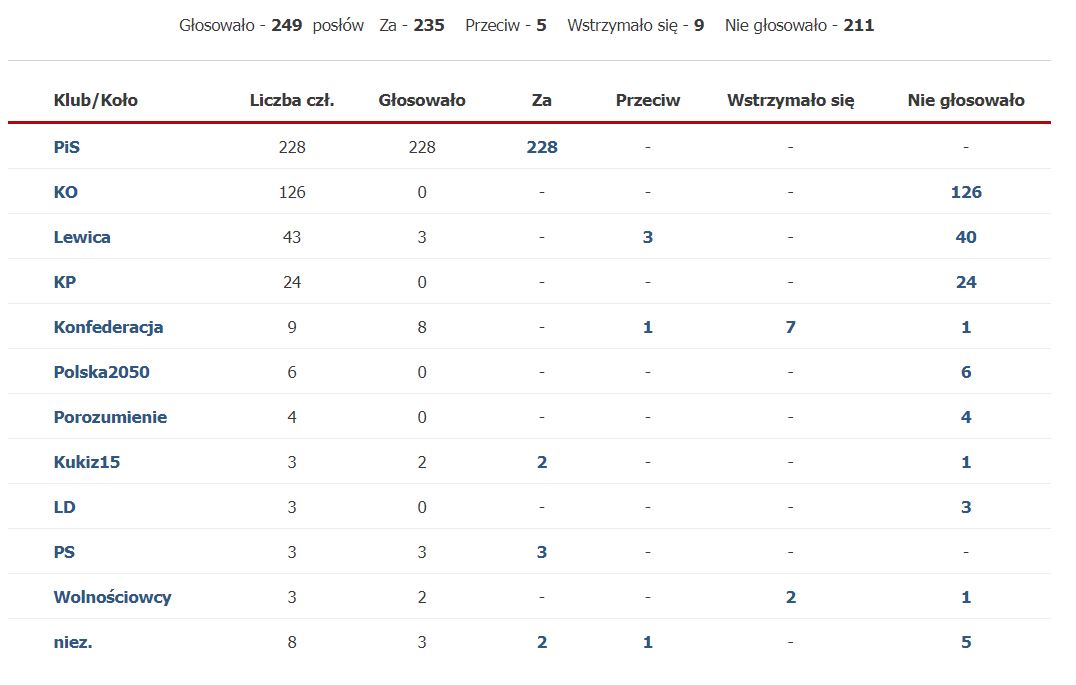The government’s majority in parliament has approved amendments to the law creating a commission to investigate Russian influence in Poland. The changes were proposed by the president just days after he had signed the law, following criticism from the US and EU over the commission’s powers.
The amendments would remove the commission’s ability to ban people from holding public office. There had been fears that this would be used against opposition politicians in the run up to this autumn’s elections.
The changes would also bar members of parliament from sitting on the commission and would create a new pathway for individuals to appeal against decisions made by it.
President Duda has proposed major changes to a law he signed just four days ago creating a commission to investigate Russian influence.
His U-turn comes after the US and EU expressed concern the body could be used against the opposition https://t.co/nIa7WLBM4S
— Notes from Poland 🇵🇱 (@notesfrompoland) June 2, 2023
However, while the amendments were approved by the majority that the ruling Law and Justice (PiS) party’s commands in the Sejm, opposition MPs either voted against them, abstained or – in the vast majority of cases – simply did not vote at all.
The opposition argues that, despite the changes, the Russian influence commission – whose members will be chosen by the Sejm – would still be used for political purposes during the elections campaing.
The amendments now pass to the opposition-controlled upper-house Senate. Even if the Senate rejects it, the more powerful Sejm will be able to overrule that decision and push through the legislation.

How the main political groups in parliament voted: za (for), przeciw (against), wstrzymało się (abstained), nie głosowało (did not vote).
“Although the president’s amendments mitigate the effects of the law, they do not remove the essence of its operation,” said Wiesław Szczepański, an MP from opposition party The Left. “Its purpose is to eliminate politicians inconvenient to the ruling party from public life.”
“This is a typical witch trial,” Katarzyna Lubnauer, a senior figure from Civic Coalition (KO), the largest opposition group, told RMF FM. “In the first version, this witch was burned; in the second version, instead of burning, they try to drown her.”
However, PiS figures dismissed such arguments, saying that the amendments to the legislation have addressed the concerns previously raised by the opposition. They argue that anyone who has not acted under Russian influence has nothing to fear from the commission’s work.
🎥@KLubnauer (@Nowoczesna) w #RozmowaRMF: Komisja weryfikacyjna to typowy proces czarownic. W pierwszej wersji tę czarownicę palono, w drugiej zamiast palić, próbuje się ją utopić @RMF24pl pic.twitter.com/u1kVQjnpWA
— RozmowaRMF (@Rozmowa_RMF) June 15, 2023
“Here sit patriots and Poles,” said Janusz Kowalski a deputy minister, pointing to the PiS benches, “and here sit pro-Russian people from the [party] of Donald Tusk, who appeared with Vladimir Putin in 2007-2014,” he continued, pointing to the benches occupied by the main opposition.
While the amended law is being processed by the parliament, its previous version is still officially in force. According to its original text, members of the commission were supposed to be nominated earlier this week, but neither the ruling party nor the opposition presented any candidates.
Meanwhile, the European Commission launched legal proceedings against Poland last week over the original version of the legislation, which it argues violates EU law.
The EU has opened legal action against Poland over its new Russian influence commission, which can ban individuals from public office.
This is an "absurd attack" and "interference in Poland's internal affairs", says a deputy leader of the ruling PiS party https://t.co/zsRYpSI1oK
— Notes from Poland 🇵🇱 (@notesfrompoland) June 8, 2023
Main image credit: Adam Guz/KPRM (under CC BY-NC-ND 2.0)

Alicja Ptak is deputy editor-in-chief of Notes from Poland and a multimedia journalist. She has written for Clean Energy Wire and The Times, and she hosts her own podcast, The Warsaw Wire, on Poland’s economy and energy sector. She previously worked for Reuters.




















